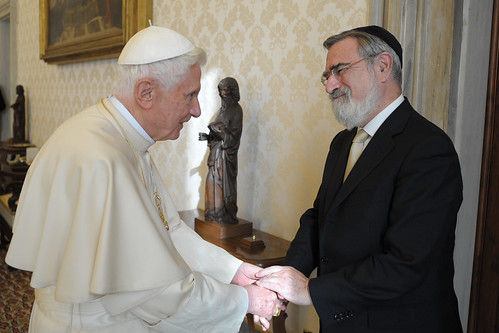
The chatter in Europe over the last few weeks has been dominated by the economic crisis. Can the Euro be saved? Is Britain isolated? Who is to blame? What do the markets think?
The Chief Rabbi of the United Hebrew Congregations of the Commonwealth, Lord Jonathan Sacks, also discussed the European economic crisis during his recent three day visit to Rome and the Holy See. But during his audience with Pope Benedict XVI, and his lecture at the Pontifical Gregorian University, he took a rather different standpoint from most commentators.
He asked: “Has Europe Lost its Soul?”. Like Pope Benedict, he argued that Europe is, above all else, facing a moral crisis of which the economic failures are a symptom. And that religious leaders should speak out, and be heard, before Europe loses its way irrevocably. In particular, he argued that “the future health of Europe, politically, economically and culturally, has a spiritual dimension. Lose that and we lose much else besides.”
I was particularly struck by the Chief Rabbi’s reminder of the Judaeo-Christian origins of the market economy. The market was once a moral vehicle, stimulating states to trade with each other and win together, not fight for the spoils and lose. Moral restraint – credit from “credo”, I believe; confidence from “fide”, shared faith; trust – was what underpinned the market. But we have lost the imperative of the pursuit of the common good in our reliance on self-interest. Modern capitalist practices have too often lost touch with the original capitalist principles, and we have seen the system come crashing around our ears.
The Chief Rabbi also reminded his audience at the Gregorian that there is much that has a price but no value. And much that we should value more which is priceless: family, community, human relationships. It is easy to become lost in the maze of commentary and controversy surrounding the economic crisis. In all this, religious leaders can help to remind us what is really important, and to find the exit route.
